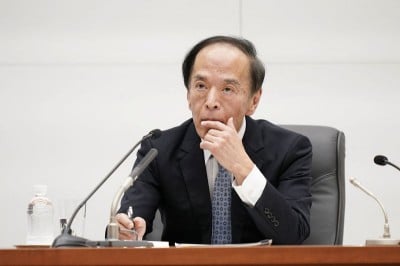 © Reuters. Bank of Japan Governor Kazuo Ueda attends a press conference after its policy meeting in Tokyo, Japan October 31, 2023, in this photo taken by Kyodo. Mandatory credit Kyodo via REUTERS ATTENTION EDITORS - THIS IMAGE WAS PROVIDED BY A THIRD PARTY. MANDATOR
© Reuters. Bank of Japan Governor Kazuo Ueda attends a press conference after its policy meeting in Tokyo, Japan October 31, 2023, in this photo taken by Kyodo. Mandatory credit Kyodo via REUTERS ATTENTION EDITORS - THIS IMAGE WAS PROVIDED BY A THIRD PARTY. MANDATOR By Leika Kihara
TOKYO (Reuters) - Recent weakness in consumption has emerged as a fresh source of concern for Bank of Japan policymakers who are eyeing an exit from negative interest rates, three sources familiar with its thinking said, suggesting market expectations of an imminent rate hike may be over-blown.
The yen and Japanese bond yields have jumped on market expectations of an imminent policy change after BOJ Governor Kazuo Ueda said on Thursday the central bank will face an "even more challenging" situation in the year-end and next year.
But Ueda's remark, which came in response to a lawmaker's question on the challenges he has faced since becoming governor in April, was taken out of context by markets and was not meant to signal an imminent policy shift, the sources said on condition of anonymity as they were not authorised to speak publicly.
"There was no intention to signal anything about the timing of a policy change," which remains up in the air, one of the sources said, a view echoed by two more sources.
To be sure, the BOJ has its eyes set on pulling short-term interest rates out of negative territory with inflation running above its 2% target for more than a year.
Rising prospects for sustained wage increases have also heightened the chance of Japan seeing inflation durably hit the target, and meet the prerequisite set by the BOJ to end years of ultra-easy policy.
But the timing remains highly uncertain given Japan's fragile economy. Some BOJ policymakers are worried about recent weak signs in consumption, as wages have yet to rise enough to offset the rising cost of living, the sources say.
Data on Friday showed Japan's economy contracted more sharply than first estimated in the third quarter, by an annualised 2.9%, as both consumer and business spending shrank.
That suggests domestic demand is not strong enough to offset the drag from sluggish global demand for Japanese exports.
Household spending fell 2.5% in October from a year earlier as inflation-adjusted real wages slumped 2.3% on-year, the 19th straight month of declines, data showed.
"The weakness in consumption is a big concern because it could prod firms to start cutting prices again," a second source said, referring to the risk of a resurgence in deflationary pressures that dogged the economy for years.
"If that happens, an early exit will be out the window."
The BOJ's current rosy projection is based on the assumption that wage increases will accelerate and give households more purchasing power, thereby allowing firms to keep raising prices.
"The BOJ's message has been unwavering, which is that it will keep ultra-loose policy until this positive wage-inflation cycle kicks off," a third source said.
The strength of Japan's economy is particularly important as an end to negative rates will likely be followed by several more increases in short-term rates, they said.
The BOJ next meets for a rate review on Dec. 18-19, followed by a more important meeting on Jan. 22-23 where the board will produce fresh quarterly growth and price projections.
Key data that could sway the timing of a BOJ exit include the central bank's "tankan" business sentiment survey due on Dec. 13, and its regional branch managers' meeting set to be held in mid-January.
The BOJ will keep dropping subtle hints that an end to negative rates may be nearing but won't signal much on the timing, the sources said.
"In the end, it will be a judgement call," one of the sources said on the timing of an exit.